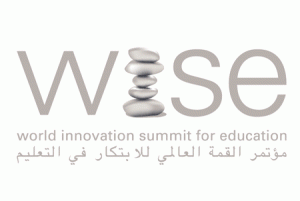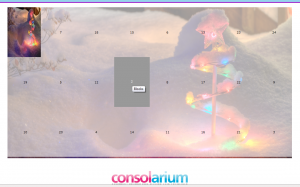

Consolarium blog
 Last week we had the great honour of representing Scottish Education at the WISE Conference in Qatar. WISE is an initiative of Qatar Foundation for Education, Science and Community Development, under the aegis of Her Highness Sheikha Moza bint Nasser.
Last week we had the great honour of representing Scottish Education at the WISE Conference in Qatar. WISE is an initiative of Qatar Foundation for Education, Science and Community Development, under the aegis of Her Highness Sheikha Moza bint Nasser.
“WISE is based on the practical awareness that the challenges in education are no longer bound by countries’ political boundaries and, therefore, its mandate is international. WISE recognises that the challenges facing the world community have never been greater - that we need innovative solutions not achieved by traditional approaches alone. WISE asserts that the desire to innovate is, in fact, an innate human need to shape and improve our environment.”
At one of the seminars I attended I had the pleasure of listening to Marc Prensky talk about his developing thoughts about ‘Teaching Digital Natives,’ (the title of his new book). I have always found Marc Prensky a good reference point particularly back in the early 2000s when I was in the early stages of exploring the theoretical aspects of games based learning. During this period Prensky’s Digital Natives vs Digital Immigrants thesis had just come out and to me it seemed to capture a moment in time where people in education were really beginning to become aware of the mismatches between that of pupil experiences and expectations of tech at home and at school. I found that this concept gave some meaning to my own experiences and to that of very many of my colleagues working in education.
Over the years Prensky’s thesis began to be questioned. People wanted evidence to back his ideas up and I  think it is fair to say that it became more and more apparent that although young learners were more at ease with technology than many of their teachers it was not necessarily the case that they were as ‘able’ with this technology than was possibly being assumed. In my experience one of the main issues about the lack of digital skills of these so called Digital Natives aspect was their lack of ability to access, analyse and synthesise information they found on the web rather than simply copying and pasting it in to a Word document to be then handed in as their own work.
think it is fair to say that it became more and more apparent that although young learners were more at ease with technology than many of their teachers it was not necessarily the case that they were as ‘able’ with this technology than was possibly being assumed. In my experience one of the main issues about the lack of digital skills of these so called Digital Natives aspect was their lack of ability to access, analyse and synthesise information they found on the web rather than simply copying and pasting it in to a Word document to be then handed in as their own work.
As I listened to Marc Prensky at WISE2010 I tweeted a few comments that were taken from his very short talk. These touched on some of the issues that have been associated with his work and ideas. I was particularly interested on his emphasis on what he described as ‘passion based teaching’. This was described as finding out what each child is passionate about and focusing on some way in on that. The practical application of this approach in a classroom of almost 30 learners was something I wanted to explore further with Marc and some of my tweets touched on this aspect of his talk. Later that evening Marc and I had a chat about perceptions of his talk and the danger of Twitter reducing the message in such a way that one might be misquoted or the message be ‘reduced’. Marc kindly accepted my offer of a quick interview where he could answer some of the questions that many of my colleagues like to explore when his ideas come up in discussion. The questions we discussed included:
You can hear the interview with Marc Prensky here:
Part 1:
A transcript of this discussion: Consolarium meets Marc Prensky part1
Part 2:
A transcript of this discussion: Consolarium meets Marc Prensky2
Many thanks to Marc Prensky for agreeing to be interviewed. Any comments about what he has said or about your take on the Digital Natives vs Digital Immigrants debate are most welcome.
More We’ve just finished creating an Advent Calendar web part for Glow. The calendar will remember the windows you open, won’t let you open windows in advance and has a “gift” of a new Scratch game in each window for you to play. You can download the web part from here and import it into your MyGLow or your own Glow Group. You can see what it looks like at http://glo.li/fPrquI.
We’ve just finished creating an Advent Calendar web part for Glow. The calendar will remember the windows you open, won’t let you open windows in advance and has a “gift” of a new Scratch game in each window for you to play. You can download the web part from here and import it into your MyGLow or your own Glow Group. You can see what it looks like at http://glo.li/fPrquI.
The code for the web part is fully commented so you can load it into a text editor and play with it if you wish! There is a non-Glow version of the calendar for you to view at http://www.glo.li/advent/ if you’d like to get an idea of how it works.
For the technical amoung you, it uses a cookie set by Javascript, to remember which windows you’ve clicked on. The windows clicked on are written into the cookie as a string of text separated by a comma. When the calendar is loaded it looks for the cookie and loads the values into an array. The links, positions of windows and alternative text for the window images are all held in arrays and can be customised.
It uses a nested for loop to created the 3 rows and 8 columns of windows. As it sequences through the loop it checks the date and the array of already clicked windows. Windows have there states: open, available to open and not available. It uses a Window.Onload event to run the loop and build the calendar.
When you click on a window, a Jquery ColorBox opens containing a page which links to a Scratch Game as a Java Applet, while a call is made using Javascript to update the contents of the window to show the image and the alternative text within. We hope everyone enjoys our calendar and the games within (all games made using Scratch).
MoreIt’s cold out there. Really cold. And snowy.
With many of Scotland’s schools remaining closed due to bad weather, a large number of teachers, schools and authorities are trying to deliver some engaging snow related learning experiences for learners via Glow.
We have just created a short Snow Globe animation task using Scratch that can be accessed by all Glow users here. It’s also more than suitable for using with your classes in school too!
Learners with access to Glow will be able to follow the video tutorials to create the animation shown below. Click the green flag to see the animation!
UPDATE! Tutorial Videos Now On YouTube
The video playlist is embedded below, or you can access on YouTube directly here
More
Find us on